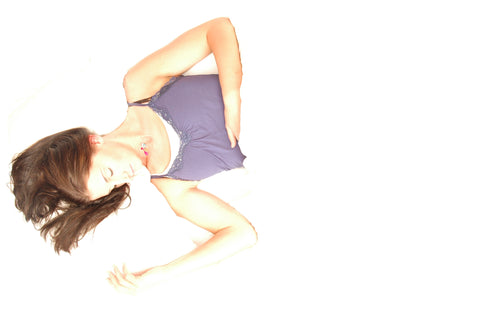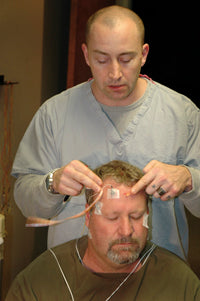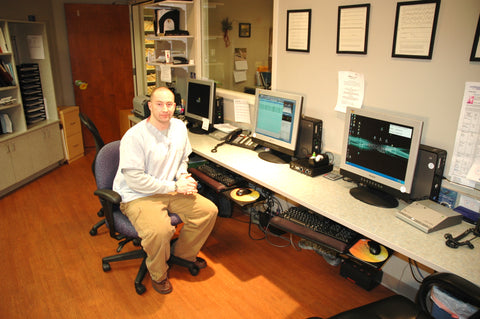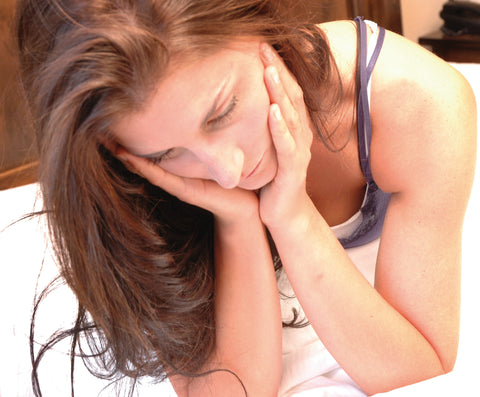Health Journal TV: The science of sleep
How a sleep study helps sleep apnea
By David Reese, Montana Health Journal
The one thing we need most in life seems so easy to get: sleep.
But while sleep may be easy to come by for some people, for millions of others it’s the tonic that is completely elusive.
The word apnea may be Greek for “without breath,” but for these people it means losing sleep./Sleep apnea affects more than 12 million Americans, according to the National Institutes of Health. Risk factors for having sleep apnea include being male, overweight, and over the age of 40, but sleep apnea can strike anyone at any age, even children. The vast majority of people with sleep apnea remain undiagnosed and therefore untreated, despite the fact that this serious disorder can have significant consequences — from high blood pressure to cardiovascular illness.
In Kalispell, Dr. Patrick Burns is committed to uncovering the mysteries of sleep and help people get the rest they need. Burns opened the Sleep Medicine Center in 1995 in Kalispell and was the first physician to practice sleep medicine in the Flathead Valley. “What I find fascinating about sleep is … every single element about sleep,” he said.
Sleep affects your concentration, memory, learning, mood disorders, cardiovascular health, diabetes — even weight gain, Burns said.
There are three types of apnea: obstructive, central and mixed. Of these three types of sleep apnea, obstructive is the most common, according to the American Sleep Apnea Association. Obstructive sleep apnea is caused by a blockage of your airway, usually when the soft tissue in the rear of the throat collapses and closes during sleep. People with untreated sleep apnea stop breathing repeatedly during their sleep, sometimes hundreds of times during the night and often for a minute or longer.
With each apnea occurrence, your brain is briefly aroused from sleep and tells your body to resume breathing. Consequently, your sleep is fragmented, and even after a full night’s sleep, people with sleep apnea still don’t feel well-rested.
Chris Freitag applied electrodes to a patient at the Sleep Medicine Center in Kalispell. David Reese photo, Montana Health Journal
Untreated, obstructive sleep apnea can cause high blood pressure and other cardiovascular diseases, memory problems, weight gain, impotency and headaches.
That’s where Dr. Burns and the Sleep Medicine Center come in.
His entire clinic is devoted to treating sleep disorders. Situated on Buffalo Hill near Kalispell Regional Medical Center, the Sleep Medicine Center looks like any other medical clinic, except for the fact there are bedrooms along a hallway and a futuristic laboratory across the hall. Patients come for one or two nights of study. During their stays, the patients are connected to a variety of electrodes and monitors so that therapists can glean the information during the night and uncover what may be keeping a person from getting a good night’s sleep.
Prior to going to sleep, patients are connected with EEG electrodes placed around their head that measure brainwave activity and eye movement. Other sensors placed on the patient’s legs and abdomen monitor leg movement and breathing. Across the hallway from the bedrooms, one of the Sleep Medicine Center’s registered polysomnographic technologists keeps track of the patient’s readings on computer screens throughout the night. This information is then used by Dr. Burns to evaluate the patient’s treatment for apnea.
The most common form of treatment for sleep apnea is a positive airway device, which is a mask worn over the mouth while sleeping. When wearing this device a gentle stream of air keeps the back of the throat open and eliminates apnea throughout the night.
Problems such as attention deficit disorder, hyperactivity, bipolar disorder and concentration or memory problems can sometimes be caused by lack of good sleep, according to Burns.
WHY GET A SLEEP STUDY
A sleep study can help detect physical ailments that might otherwise be misdiagnosed, Burns said. “Often times the sleep problems are misdiagnosed, and people are given antidepressants, thinking they’re depressed, or thyroid medicine, thinking that they have thyroid problems,” Burns said. “I’m not saying those conditions don’t exist, but if you have those conditions and you have sleep apnea, it’s adding insult to injury. Sleep apnea to someone with hypertension is like giving a diabetic a hot fudge sundae,” Burns said. “It’s just not beneficial for the (existing) condition.”
People get referred to the Sleep Medicine Center by physicians for health problems such as heart conditions or hypertension — not just for snoring. “We don’t necessarily do a sleep study just because someone snores, but if they have other associated medical conditions or complain of tiredness after adequate sleep, then that’s definitely an indication of a sleep study,” Burns said.
Burns seems to eat, drink and sleep — sleep. As the sole provider of sleep therapy in northwest Montana, his job has been to educate the public and the medical community about sleep disorders and their treatments. He finds the work fascinating, and he’s now focusing on research on the substructure of sleep and how it affects learning. A person who is well rested is someone who will do better at learning, Burns said.
Good sleep is critical to learning mental and physical activities, from piano to snowboarding.
“Getting a good night sleep after you practice is critical for those things to get integrated into your brain and for your brain to learn that,” Burns said. “It’s the same as with anything you study. If you do not sleep, you will not learn it. Sleep is the glue that makes everything work. If you study something but are sleep deprived, you will not have learned it.”
Physical ailments such as heart disease or stroke can be helped by treating sleep apnea. In fact, cardiovascular function is one of the main areas of current sleep research, Burns said.
Treating sleep disorders can have a beneficial effect on other health problems, Burns said. Some of his adolescent patients who had been tested for attention deficit disorders were able to get off stimulants by treating their sleep apnea at the Sleep Medicine Center, Burns said.
He has also had fibromyalgia patients whose symptoms went away by treating their sleep disorders.
For people with apnea who use the positive airway masks, most swear by them and won’t spend a night away from home without them.
Chris Freitag, one of the therapists at the Sleep Medicine Center, was a chronic snorer before he became a convert to using the airway mask. He now sleeps restfully, waking refreshed and full of energy for the day. Other people use forms of caffeine throughout the day; he just gets a good night’s sleep.
“I wake up feeling revived and rested in the morning,” Freitag said. “I have more energy to take me through the day. I’m no longer snoring, and waking up two or three times a night to use the bathroom.”
It’s these kind of results that make him excited to do his job as a registered polysomnographic technologist. “I get a lot of satisfaction seeing someone come in who is tired, dragging, exhausted, and their wives or husbands are annoyed because they can’t sleep,” he said. “Being able to treat them here in one or two nights totally changes their lives, gives them energy and improves their health.
“I like the fact I can change a person’s life, virtually overnight. It feels good to do that for somebody. And they always say ‘I should have done this 10 or 15 years ago.’”
Freitag said it sometimes takes an “angry spouse” to get people to come in for a sleep study. But they don’t have to have an angry bed mate to coerce them into getting a sleep study. “People just get sick and tired of being sick and tired,” he said. “They eventually have to do something.”
Poor sleep can affect adolescents and children, too.
In America’s culture of caffeine and energy drinks, the idea of proper sleep often takes the back seat as a remedy for feeling tired. While Burns said “everyone can burn the candle at both ends,” our bodies cannot take that for long, he said. “Everyone can take a hit of caffeine, but it’s the extent to which you do it.”
Journal TV: Sleep Therapy from Montana Living on Vimeo.









Leave a comment